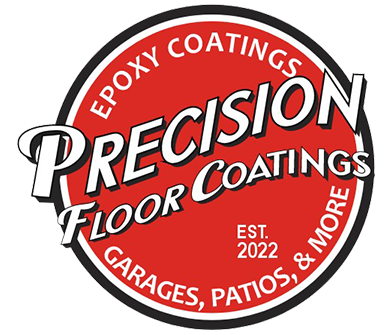Q. What are the benefits of epoxy floors?
A. Some of the benefits of an epoxy floor are that it is durable and strengthens the concrete beneath it, as well as protecting the concrete from damage. It's great for concrete that already has cracks because we will fix the cracks before coating, and after it will be like the cracks were never there. Epoxy floors are beautiful and easy to keep clean. They are chemical resistant and with our polyaspartic topcoat they become UV resistant.
Q. What is epoxy flooring exactly?
A. Epoxy is a two-part component that when mixed together creates a chemical bond and hardens. Once the epoxy has been applied it works its way into the pores of the concrete creating a strong bond with the concrete, but the right prep work must happen in order for the epoxy to bond to the concrete. So, the concrete needs to be mechanically ground before application (similar process and purpose as sanding a wall before painting it0.
Q. What are the different types of epoxy flooring?
A. There are many different variants of epoxy. Some epoxies are breathable and hold up well with high moisture, some are flexible, some have fast cure times so no matter the conditions of the concrete there is an option that suits the customer best. The epoxy I use most and is what I use for the garage floor coatings is durable, fast curing and holds up to moisture much better than the products that a lot of the competition uses. The epoxy I use holds up to 8 lbs. per moisture pressure whereas a lot of competitors use a material that only holds up to 2-3 lbs. of moisture pressure.
Q. Where can epoxy flooring be applied?
A. Epoxy flooring is most popular when it comes to garage floors but also basement, patios, driveways basically you can put it over any concrete surface and with the polyaspartic topcoat I provide it is UV resistant meaning you can apply it to concrete that is exposed to sunlight and you don't have to worry about it yellowing.
Q. Which are the best places to get epoxy flooring?
A. Garage floors, patios, basements, pool decks and restaurant kitchens.
Q. How long does it take to install?
A. With my fast curing epoxy, I can have most garage floors done in 1 day and customers can walk on it the next day.
Q. How long can a professionally installed epoxy flooring system last?
A. With the right prep work and high quality materials an epoxy floor can last decades.
Q. Can you put epoxy flooring on damaged concrete?
A. You can definitely coat over damaged concrete and you should coat over it to protect it from getting worse however in some cases the concrete is damaged beyond repair and will need to be removed and re-poured but that is extremely rare.
Q. Are there disadvantages of epoxy floor coatings?
A. When professionally installed an epoxy floor doesn't really have any disadvantages. But unfortunately there are cheap products such (home depot and Lowe's epoxy kits etc.) as well as contractors and homeowners that don't know what they're doing and don't do proper prep work. These floors typically tend to fail within months and give the concrete coatings industry a bad name. That is why it is so important to hire a professional who has the right equipment, the right materials and knows what they are doing.
Q. Are epoxy floors slippery?
A. The decorative flakes that cover the floor give it some texture. I also add a non-slip additive to the topcoat so the customer won't have to worry about slipping.
Q. Are epoxy floors good for commercial settings?
A. Epoxy floors are a great option for commercial spaces. You can commonly find them in restaurant kitchens, pharmaceutical plants, and warehouses.
Q. What is the maintenance like for an epoxy floor?
A. Epoxy floors are very easy to maintain. You can sweep them, mop them, hose them down. The polyaspartic topcoat makes it so any dirt, spills, or contaminates will wipe right up.
